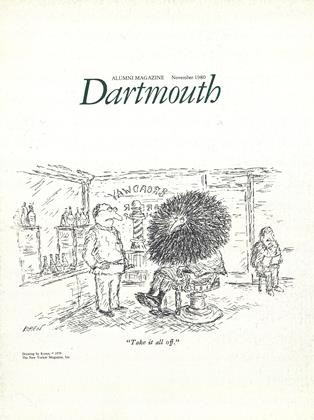At almost any time of day or night the Kiewit computers tend to other business a brief four hours in the early morning and most of Sunday any one of us on this campus can mosey up to a terminal, type in a personal user number and the characters "Dart-Job***" for an open sesame to the world of student job opportunities on the local scene.
For some of us, to be sure, a fudged attempt to sign on as often as not evokes an incredulous "WHAT?" or some imperious put-down from the screen. But Dartmouth undergraduates, as at-ease with the computer as their parents were with manual typewriters, have literally at their fingertips a broad range of jobs, in several categories. Type "ODD," for instance, for occasional work, from bartending at a Norwich cocktail party to baby-sitting for a visiting poet's children. "PAR" means part-time work on a regular schedule; "LEA," leave-term jobs in college offices or area businesses; "WOR," work-study possibilities. "Dart-Job***" also offers, more or less gratuitously, information on more or less relevant up-coming programs: workshops on job-hunting and rdsumewriting and, in mid-July, a lecture with the intriguing title "Fatherhood After Kramer."
For whatever reasons the economy, a new materialism, or looking out for Number 1 Dartmouth undergraduates, like their peers across the land, are asking not so much what they can do for their country or their country for them as what they can do for themselves. Jobs are the new preoccupation.
Whereas ten years ago, 60 to 70 per cent of graduating classes went straight to graduate school, now as many as 65 per cent are seeking gainful employment, even if they intend to return to school within a few years' time. And the Dartmouth Plan, with its staggered terms of residence and non-traditional periods of vacation, foreign study, or off-campus work, permits undergraduates to make money, try a potential career on for size and taste, or test out a geographic area.
The "old-boy network," whereby established alumni have traditionally extended a helping hand to younger or less fortunate brethren, has been functioning informally among the Ivies for a long while, but changing times have put new demands on the system. Through the Career and Employment Services office at the College, the network has been expanded, shaped, structured, and codified.
Classes, clubs, and individual alumni have volunteered or been recruited to offer time, money, and know-how to help students or recent graduates gain a toehold in their chosen professions. They have been a major source of a file of some 1,000 leave-term opportunities the world over, to which the CES office tries to match appropriately qualified student applicants. For several years, alumni clubs have elected job-placement officers to coordinate the area effort with varying degrees of success. The class of 1941 originated the "Is There Life After Dartmouth?" programs, bringing class members in different occupations to the campus to participate in panel discussions and to talk with individual students about their fields. The class of 1951 has recently undertaken support of similar programs, in which young alumni and undergraduates who have held leave-term jobs in Washington or New York, say, offer tips on living and working, job-hunting, finding housing or recreation in that particular city.
Only last spring, on a tentative basis, CES commenced establishment of an "Alumni Network," with encouraging early returns. All alumni in 11 urban areas plus the Hanover region were sent career advisory questionnaires, to ascertain whether or not they would be willing to come to the campus at their own expense to speak to student groups, to work with local clubs, to provide leaveterm jobs, or do individual counseling on their own home grounds.
"We had a very high response rate," says Victoria Ball, CES's associate director for employment from 1977 until late June, when she left to take over overall responsibility for Brown University's career and job counseling. "Over 2,000 filled out the questionnaire, and we have some very impressive people on the list who are enthusiastic about helping any way they can. And we've picked up a lot of people who have not been involved with the College in other ways since they left."
 View Full Issue
View Full Issue
More From This Issue
-
 Feature
FeatureHAIR
November 1980 By Dan Nelson -
 Feature
FeatureNow Let Him Praise Emmets
November 1980 By Robert Sullivan -
 Feature
FeaturePostmark: Bucharest
November 1980 By Douglas Reichert -
 Article
ArticleTrusteeship and the Alumni
November 1980 -
 Article
ArticleUnofficial Arbiter
November 1980 By Patricia Berry '81 -
 Article
ArticleWanted: Road-trip Messerly
November 1980 By Parker B. Smith '66








